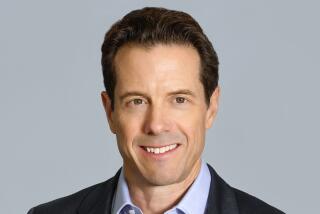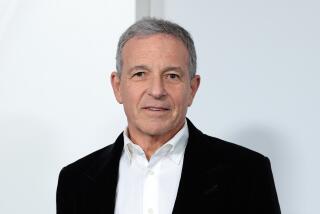After 30 years in Murdoch’s empire, Peter Rice faces new challenges in Disney’s kingdom
For three decades, Peter Rice has climbed his way up the corporate ladder of Rupert Murdoch’s entertainment empire, establishing himself as part of the clan in every way but his name. Through his rise, he oversaw the release of Oscar-winning films and led a television production juggernaut.
But the low-key Rice will face his biggest test yet as he joins a new family at Walt Disney Co., after the Burbank entertainment company completes its $71.3-billion purchase of most of 21st Century Fox’s entertainment assets.
This week, Disney charged Rice with remaking the company’s TV business, including ABC, in order to remain relevant in a world of cord cutters and big-spending digital rivals such as Netflix, Apple, Amazon.com and YouTube.
As chairman of Walt Disney Television and co-chair of Disney Media Networks, Rice will have to wrangle a diverse portfolio, adding the ABC studio, broadcast network, local stations and young-adult network Freeform to his purview. He is already responsible for 20th Century Fox Television, FX Networks and FX Productions, Fox 21 Television Studios and the National Geographic channels. (Disney’s ESPN will not fall under Rice’s umbrella.)
Rice’s major goal will be to ramp up Disney’s TV programming pipeline with shows that appeal to audiences who watch ABC, Disney children’s channels, and streaming services that are key to the company’s future.
He must also navigate an unfamiliar Disney corporate culture, which is intensely focused on maintaining its family-friendly brand identity.
But Rice, 51, has a successful track record of leading a robust TV production operation in an intense corporate environment.The fact that Disney Chief Executive Bob Iger broke with company tradition to bring in an outsider indicates his confidence in the Fox TV executive bench, analysts said.
“He had a big job before, and Fox television was very successful,” said New York-based media analyst Michael Nathanson. “He’s proven he’s adept at managing scale and juggling all these conflicts. I’m interested in seeing what Peter Rice can do with a different set of assets.”
Rice declined to comment for this article.
On Wednesday, Rice addressed growing anxieties among Fox employees affected by the pending merger with Disney. In overflowing town hall meetings on the Fox lot in Century City, he and Chief Financial Officer John Nallen said employees would learn in the coming weeks who will join Disney and that severance packages would be offered to those not making the move.
Raised in Britain and educated at University of Nottingham (earning a degree in American studies), Rice has spent his entire career in Murdoch’s orbit, first joining Fox’s film unit in 1987 as an intern. His father, a representative of an electricians union, played a pivotal role when Murdoch was building his British newspaper empire and fighting organized labor in the 1980s. It was through that family connection that Rice became an adjunct member of the Murdoch family.
More than many corporate executives, he spent much of his career deeply embedded in the creative side of the business. After serving as a production executive at the film studio, 20th Century Fox, Rice became president of Fox Searchlight, releasing films such as the Oscar-winning “Slumdog Millionaire” and fan favorites including “Napoleon Dynamite,” “Juno” and “Little Miss Sunshine.” Though his Fox film tenure was not without setbacks (he also led the failed Fox Atomic label), the job let Rice develop his chops as a leader and show his ability to pick content.
“Obviously he has an ability to work really well with higher management,” said Jeffrey Cole, director of the Center for the Digital Future at USC. “He has a great understanding of the economics of the business, and I would add that he has great taste.”
Rather than promote him to run the big Fox studio, Murdoch shifted Rice into television in 2009, a decision that surprised many in the industry. Murdoch wanted a close lieutenant on the TV side and the switch allowed Rice to become well versed in the most important, and most profitable, part of the Murdoch empire.
One of his immediate challenges was to fill Fox’s lineup with shows other than the aging reality competition series “American Idol.” In 2012, he was named chairman and chief executive of the Fox Networks Group — the most profitable unit of the company, which included Murdoch’s booming cable channel business.
That experience with programming and production should be an advantage for Rice at Disney, former associates said.
“All he wants to do is make great TV shows,” said Sony Pictures Entertainment Chairman Tony Vinciquerra, Rice’s predecessor as chairman of Fox Networks Group. “That’s what he loves to do.”
Others say that it is difficult to detect his fingerprints on any particular show or strategy since he took over at Fox’s TV division. It was executives such as Kevin Reilly, and most recently Dana Walden and Gary Newman at Fox, and John Landgraf at FX who developed shows and managed relationships with talent. Walden and Landgraf will both join Disney with Rice.
People who have worked with Rice say he’s bright, charming and particularly adept at navigating corporate politics. Rice on Monday called some of his soon-to-be reports, a gesture that was appreciated by Disney stalwarts.
He purposely stays out of the limelight, eschewing executive profiles in newspapers and magazines or racking up industry awards and organization honors. Some executives at Fox saw him as a cipher.
“Nobody really knows him,” said one former Fox executive who was not authorized to comment. “He goes out of his way to remain an enigma.”
It remains to be seen how Rice will change the network, which has a strong news programming arm and a popular morning show but lacks the ratings boost from professional football. For the 52-week season that ended last month, ABC landed in second place among the broadcasters in the advertiser-coveted 18-to-49 demographic (tied with CBS) but fell 13%, according to Nielsen.
The network had a pair of recent hits with the autism-themed “The Good Doctor” and the comedy revival of “Roseanne.” But Disney fired star Roseanne Barr after she posted a racist tweet, later deciding to resurrect the show as “The Conners.”
ABC Studios has always been viewed in the entertainment community as a vehicle to produce shows for the ABC network. Although that tactic fits with Disney’s vertically integrated tendencies, it has scared off prominent producers who want their shows to land at the best network for them — not necessarily another unit of the company.
By contrast, Fox’s TV studio is more flexible, making some of its biggest hits for other networks. Fox’s “This Is Us” airs on NBC, for example, while “Modern Family” runs on ABC. It’s unclear whether Disney’s TV business will become more flexible with Rice at the helm.
Fox’s TV business has had its own share of problems recently, reflecting both a lack of breakout hits and the troubles facing linear television ratings and advertising.
“The industry’s challenges are Peter Rice’s challenges,” Pivotal Research Group analyst Brian Wieser said.
Another challenge for Rice will be to meld two wildly different cultures. Fox gives executives free rein to say what they want and create shows as they see fit, compared with the more buttoned-up Disney.
“Fox is famously freewheeling, and Disney’s a little more monolithic,” said Matthew Harrigan, a media analyst with Buckingham Research.
Rice will have to work closely with Disney’s Kevin Mayer, who this year was named chairman of Disney’s direct-to-consumer division. Mayer oversees streaming services, including the upcoming Disney-branded online network set to rival Netflix, as well as its stake in Hulu. He also reports to Iger and is considered his potential successor.
Several analysts questioned how the corporate structure would work, but Nathanson isn’t worried. If anything, he said, Disney has a track record of letting its acquisitions, such as Marvel and Pixar, maintain the qualities that make them successful.
“I’ve really been impressed with Disney and Bob Iger’s ability to keep the companies he acquires pure in terms of their culture,” Nathanson said. “I don’t think they bought the Fox TV studio to change the culture of Fox.”
Twitter: @MegJamesLAT
More to Read
Inside the business of entertainment
The Wide Shot brings you news, analysis and insights on everything from streaming wars to production — and what it all means for the future.
You may occasionally receive promotional content from the Los Angeles Times.












